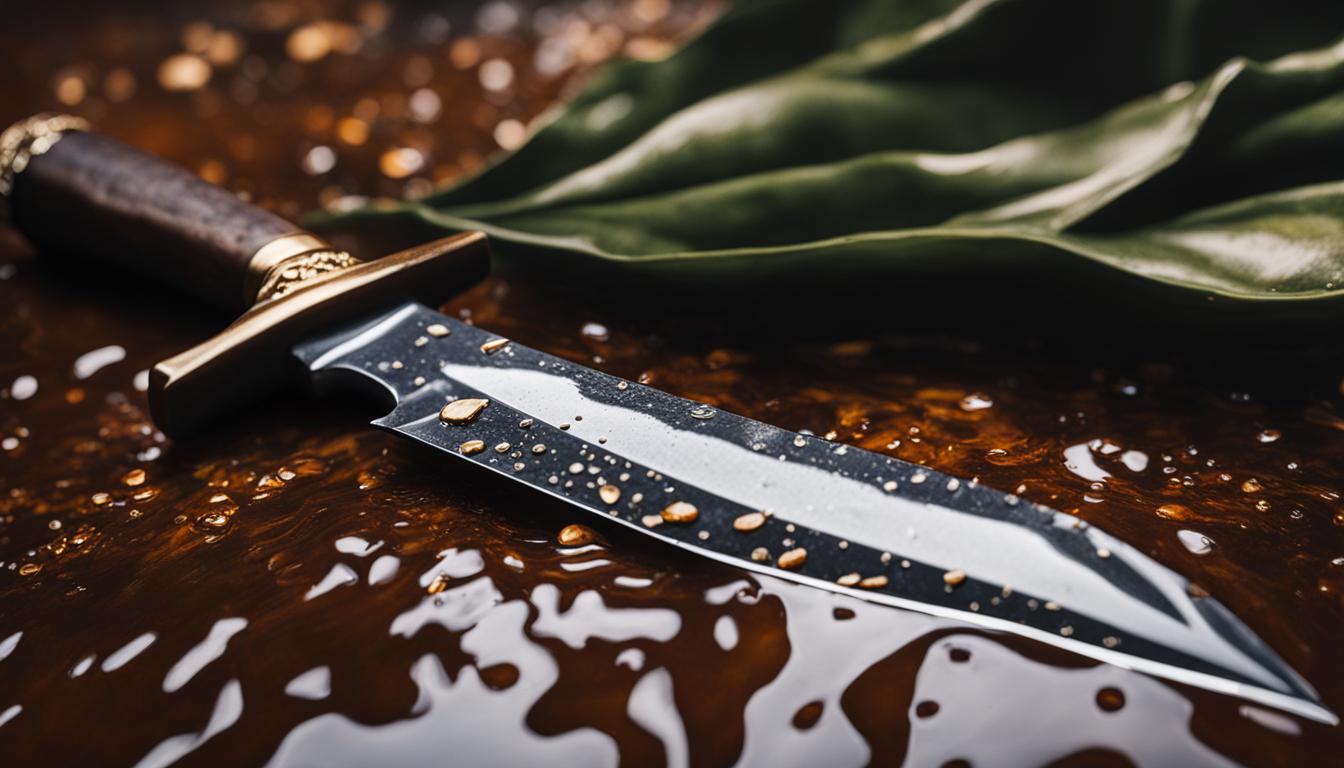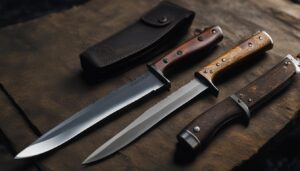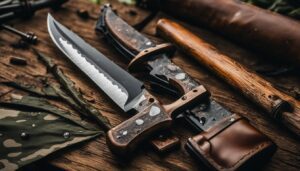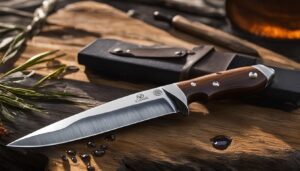A hunting knife is an essential tool for hunters and outdoor enthusiasts. However, keeping the blade in optimal condition and preventing rust can be a challenge. In this guide, I will explore various techniques and tips to prevent rust on hunting blades, ensuring their longevity and maximizing performance. We will also discuss rust-resistant materials and protective measures to keep your hunting knife rust-free.
Key Takeaways:
- Proper maintenance and rust prevention techniques are crucial for maintaining hunting knives.
- Regularly clean and dry your hunting knife after each use to remove moisture and debris.
- Consider applying a rust inhibitor or protective coating to the blade for added protection.
- Store your hunting knife in a dry environment and use a sheath or protective cover.
- Regularly inspect, sharpen, and oil the blade to ensure its longevity and performance.
Understanding the Importance of Rust Prevention for Hunting Knives
Rust can significantly impact the performance and lifespan of a hunting knife. Not only does it compromise the sharpness of the blade, but it also hinders the cutting ability and makes the knife more prone to breakage. Additionally, rust detracts from the aesthetic appeal of the knife, diminishing its overall value and desirability. As a hunter or outdoor enthusiast, it is crucial to recognize the importance of rust prevention and take proactive measures to protect your hunting blade.
Preventing rust on hunting knives is essential because it ensures that they remain in optimal condition for a longer period, maximizing their performance. When a knife blade develops rust, it becomes dull and less efficient, making it difficult to make clean cuts. Rust can also weaken the structural integrity of the knife, making it more susceptible to snapping or chipping during use. By preventing rust, you can maintain the sharpness of the blade, enhance cutting precision, and increase the overall lifespan of your hunting knife.
Furthermore, a rust-free hunting knife not only performs better but also retains its visual appeal. Rust stains and corrosion can make a knife look worn out, aged, and unattractive. On the other hand, a well-maintained and rust-free hunting blade not only reflects your commitment to proper maintenance but also adds a touch of professionalism and pride to your outdoor gear. By taking the necessary steps to prevent rust, you can ensure that your hunting knife remains a reliable and visually appealing tool for your hunting adventures.
Proper rust prevention is crucial for hunters and outdoor enthusiasts who rely on their knives for various tasks. By understanding the impact of rust on blade performance and taking proactive measures to prevent its formation, you can ensure that your hunting knife remains sharp, durable, and ready for any hunting challenge.
The importance of rust prevention cannot be overstated when it comes to hunting knives. By protecting your blade from rust, you not only maintain its performance and longevity but also enhance its overall value and visual appeal. In the next section, we will explore some effective tips and techniques for preventing rust on hunting knives, ensuring that you can enjoy a rust-free tool for all your hunting expeditions.
Tips for Preventing Rust on Hunting Knives
When it comes to maintaining your hunting knife and preventing rust, there are several techniques and practices you can follow. By implementing these preventative measures, you can ensure that your hunting knife remains in optimal condition, ready for your next outdoor adventure.
1. Clean and Dry Your Knife After Each Use
One of the most crucial steps in preventing rust on your hunting knife is to clean and dry it thoroughly after each use. Use a mild soap or dishwashing detergent to remove any dirt, debris, or residue from the blade.
Once cleaned, make sure to dry the knife completely with a clean cloth to remove any moisture. Moisture is one of the main culprits that can lead to rust formation, so it’s essential to ensure your knife is completely dry before storing it.
2. Apply a Rust Inhibitor or Protective Coating
To provide an extra layer of protection against rust, you can apply a rust inhibitor or protective coating to the blade. These products create a barrier that helps prevent moisture from coming into contact with the metal, reducing the chances of rust formation.
When applying a rust inhibitor or protective coating, make sure to follow the manufacturer’s instructions carefully. Apply a thin, even layer over the entire blade, and allow it to dry completely before storing your knife.
3. Store Your Knife in a Dry Environment
The way you store your hunting knife plays a significant role in preventing rust. It is essential to store your knife in a dry environment to minimize exposure to moisture. Avoid storing it in damp areas such as basements or garages.
Using a sheath or a protective cover can also help prevent rust by providing an additional barrier against moisture. Make sure the sheath or cover is clean and dry before placing your knife inside.
4. Regularly Inspect and Maintain the Blade
Regular inspection and maintenance are key to preventing rust and ensuring the longevity of your hunting knife. Inspect the blade regularly for any signs of rust or corrosion. If you notice any, take immediate action to remove the rust using a rust remover or a mixture of vinegar and baking soda.
In addition to rust removal, it’s essential to maintain the sharpness of the blade by regularly sharpening it. You can use a sharpening stone or a honing rod to keep the blade sharp and in optimal cutting condition. Applying a thin layer of oil to the blade can also help prevent rust and corrosion.
5. Avoid Exposure to Harsh Elements or Corrosive Substances
Lastly, it’s important to protect your hunting knife from exposure to harsh elements and corrosive substances. Avoid leaving your knife outdoors for extended periods, especially in humid or salty environments.
If you use your hunting knife for cleaning game, make sure to clean it thoroughly afterward to remove any blood or acidic substances that can cause corrosion. Prompt cleaning and maintenance will help prevent rust and ensure the longevity of your hunting knife.
By following these tips and techniques for preventing rust on your hunting knife, you can maintain its performance and extend its lifespan. Remember to clean and dry your knife after each use, apply a rust inhibitor or protective coating, store it in a dry environment, inspect and maintain the blade regularly, and avoid exposure to harsh elements or corrosive substances. With proper care, your hunting knife will remain rust-free and ready for your next outdoor adventure.
Rust-Resistant Materials for Hunting Knives
When it comes to selecting a hunting knife, choosing a blade made from rust-resistant materials is essential. These materials have inherent properties that make them more resistant to rust and corrosion, ensuring the longevity and performance of your knife. Here are some of the best materials for rust prevention:
- Stainless Steel: Stainless steel is widely known for its rust-resistant properties. It contains chromium, which forms a protective layer on the surface of the blade, preventing rust formation. Stainless steel hunting knives are highly durable and low-maintenance, making them a popular choice among outdoor enthusiasts.
- High-Quality Carbon Steel with Protective Coating: Carbon steel blades are renowned for their sharpness and edge retention. However, carbon steel is prone to rusting. To combat this, some manufacturers apply a protective coating, such as a non-stick finish or a ceramic coating, to enhance rust resistance.
- Alloy Steels: Certain types of alloy steels, such as D2 and S30V, offer excellent rust resistance while maintaining superior strength and hardness. These steels are specially formulated to resist corrosion, making them ideal for hunting knives subjected to harsh outdoor conditions.
When choosing a hunting knife, consider the specific requirements of your outdoor activities and the environmental conditions you will encounter. Each material has its own advantages and trade-offs, so make sure to select the one that best suits your needs.
Investing in a hunting knife made from a rust-resistant material will ensure that your tool remains in optimal condition for years to come. By using stainless steel, high-quality carbon steel with a protective coating, or specific alloy steels, you can enjoy the benefits of an anti-corrosion knife that is not only functional but also aesthetically appealing.
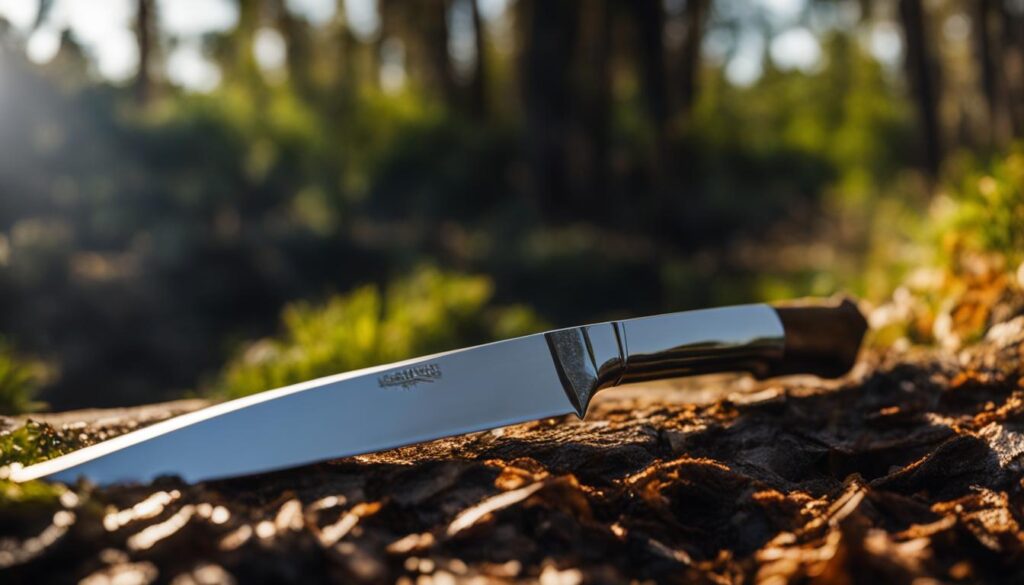
Comparative Overview of Rust-Resistant Hunting Blade Materials
| Material | Rust Resistance | Sharpness | Durability |
|---|---|---|---|
| Stainless Steel | High | Good | Good |
| Carbon Steel with Protective Coating | Medium | Excellent | Good |
| Alloy Steels (D2, S30V) | High | Excellent | Excellent |
Note: The rust resistance, sharpness, and durability may vary depending on the specific composition and quality of the materials used.
Conclusion
Proper maintenance and rust prevention techniques are crucial for keeping your hunting knives in optimal condition. By implementing the tips and practices mentioned in this guide, you can prevent rust on your hunting blade and ensure its longevity and performance.
Remember to clean and dry your knife thoroughly after each use, removing any moisture and debris that could lead to rust formation. Storing your knife in a dry environment and using a sheath or protective cover will further protect it from rust.
Regularly inspecting and maintaining the blade, including sharpening and oiling, will keep it in top shape. Additionally, choosing a hunting knife made from rust-resistant materials, such as stainless steel or high-quality carbon steel with a protective coating, will provide added durability and protection against rust.
By following these measures, you can enjoy a rust-free hunting tool that will serve you for years to come, ensuring a long-lasting and reliable companion on your outdoor adventures.
FAQ
Why is rust prevention important for hunting knives?
Rust can compromise the performance and lifespan of a hunting knife, affecting its sharpness, cutting ability, and durability. Preventing rust helps maintain optimal blade performance and longevity.
What techniques can I use to prevent rust on my hunting knife?
Cleaning and drying the knife after each use, applying a rust inhibitor or protective coating, storing the knife in a dry environment, and regularly inspecting and maintaining the blade can all help prevent rust formation.
What materials are rust-resistant for hunting knives?
Some rust-resistant materials commonly used for hunting blades include stainless steel, high-quality carbon steel with a protective coating, and certain types of alloy steels. Choosing a hunting knife made from these materials can minimize the risk of rust formation.
How often should I clean and maintain my hunting knife?
It is recommended to clean and dry your hunting knife after each use to remove moisture and debris. Regular maintenance, including sharpening and oiling, should be performed as needed to keep the blade in optimal condition.
Can exposure to harsh elements or corrosive substances cause rust on hunting blades?
Yes, exposure to harsh elements, such as saltwater or acidic environments, as well as corrosive substances, can increase the risk of rust formation on hunting blades. It is best to avoid exposing your knife to these conditions.
